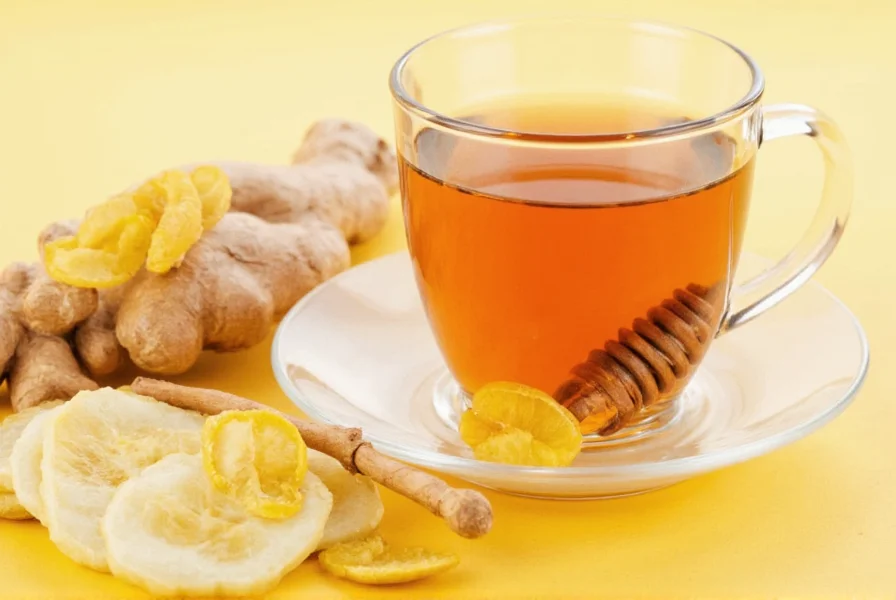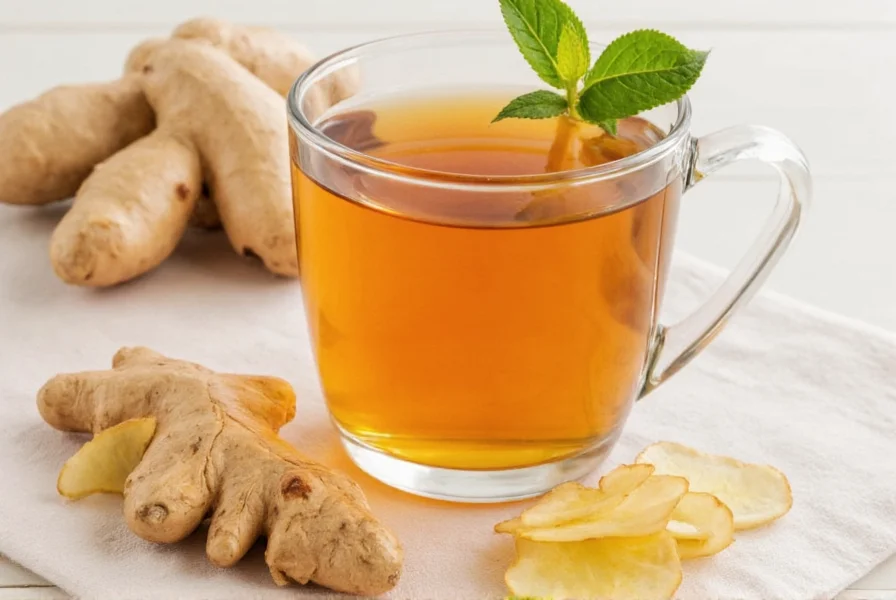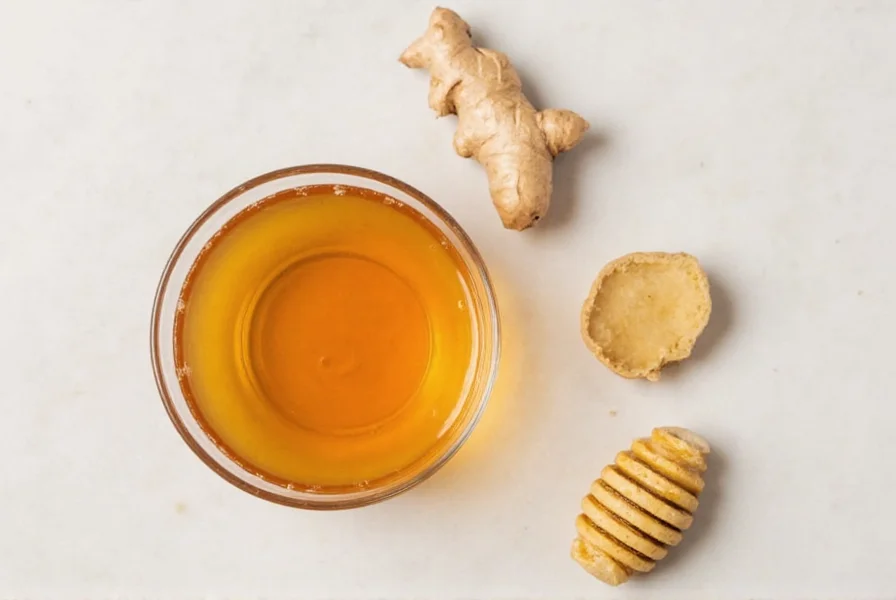Ginger and honey tea represents one of the most enduring natural remedies across various cultures. This simple combination leverages the therapeutic properties of both ingredients to create a beverage with multiple health applications. Modern research increasingly validates what traditional medicine has recognized for centuries about this powerful pairing.
Science-Backed Health Benefits of Ginger and Honey Tea
Ginger and honey tea provides several evidence-supported health advantages that extend beyond simple comfort. Understanding the specific mechanisms behind these benefits helps users maximize their effectiveness.
Digestive Health Improvement
Ginger's active compound gingerol accelerates gastric emptying and reduces intestinal inflammation. Clinical studies demonstrate ginger's effectiveness in alleviating nausea from various causes, including morning sickness and chemotherapy-induced nausea. Honey complements this effect by promoting beneficial gut bacteria. For those seeking a natural remedy for digestive discomfort, ginger honey tea for digestion offers measurable relief within 30 minutes of consumption.

Immune System Support
The combination provides dual immune support through ginger's antioxidant properties and honey's antimicrobial effects. Research published in the Journal of Food Science confirms that raw honey contains hydrogen peroxide and other compounds that inhibit bacterial growth. When preparing ginger tea with honey for immune system enhancement, using raw, unprocessed honey preserves these beneficial properties. This makes it particularly valuable during cold and flu season as part of a comprehensive wellness strategy.
Anti-Inflammatory Properties
Ginger contains potent anti-inflammatory compounds that inhibit cytokine production. A 2021 review in Nutrients journal found ginger supplementation significantly reduced markers of inflammation in multiple clinical trials. When combined with honey's flavonoids, this creates a powerful natural anti-inflammatory beverage. Those exploring the anti-inflammatory properties of ginger tea will find consistent daily consumption provides cumulative benefits for chronic inflammatory conditions.
Traditional Uses vs. Scientific Evidence
While many cultures have used ginger and honey tea for centuries, modern science helps distinguish evidence-based benefits from anecdotal claims. Research confirms effectiveness for:
| Claimed Benefit | Scientific Support Level | Key Research Findings |
|---|---|---|
| Nausea relief | Strong | Multiple studies show 1g ginger reduces nausea by 30-40% |
| Sore throat relief | Moderate | Honey provides symptomatic relief comparable to some cough medicines |
| Weight loss aid | Limited | Minor metabolic effects but not significant for weight management |
| Cold symptom reduction | Moderate | Reduces symptom duration by 1-2 days in clinical observations |
Understanding these distinctions helps users set realistic expectations about how ginger and honey tea can support their health goals without overstating its capabilities.
Optimal Preparation Method
Maximizing the benefits of ginger and honey tea requires proper preparation. The most effective method involves:
- Using fresh ginger root (1-2 inches) thinly sliced or grated
- Simmering in 8-12 ounces of water for 10-15 minutes (not boiling to preserve compounds)
- Allowing to cool slightly before adding honey (above 140°F destroys beneficial enzymes)
- Using raw, unprocessed honey for maximum therapeutic value
This preparation method for how to make ginger honey tea for cold symptoms preserves the active compounds while creating a soothing beverage. Adding lemon can enhance both flavor and vitamin C content.
Safety Considerations and Appropriate Usage
While generally safe, ginger and honey tea requires some precautions:
- Dosage: Limit to 1-2 cups daily; excessive ginger (more than 4g) may cause heartburn
- Medication interactions: Ginger may interact with blood thinners; consult your doctor if taking anticoagulants
- Special populations: Avoid giving honey to children under 1 year due to botulism risk
- Pregnancy: Moderate ginger consumption (up to 1g daily) is generally considered safe
Those with gallstone disease should consult a healthcare provider before regular consumption, as ginger may increase bile production. Understanding potential side effects of ginger honey tea ensures safe enjoyment of its benefits.
When to Seek Professional Medical Advice
Ginger and honey tea serves as a complementary wellness practice, not a replacement for medical treatment. Consult a healthcare provider if:
- Symptoms persist beyond 7-10 days
- Experiencing severe pain or high fever
- Managing chronic conditions like diabetes (honey affects blood sugar)
- Considering long-term daily consumption for therapeutic purposes
This natural remedy works best as part of a comprehensive health approach rather than a standalone treatment for serious medical conditions.
Conclusion
Ginger and honey tea represents a time-tested natural remedy with scientifically validated benefits for digestive health, immune support, and inflammation reduction. When prepared correctly and consumed in moderation, it provides a valuable addition to daily wellness routines. The key to maximizing benefits of ginger tea with honey lies in understanding both its capabilities and limitations within a holistic health approach. As research continues to explore this ancient remedy, we gain deeper insights into how these natural ingredients work synergistically to support our wellbeing.

How often should I drink ginger and honey tea for maximum benefits?
For general wellness, 1-2 cups daily provides optimal benefits without risk of side effects. When addressing specific concerns like cold symptoms, you can safely consume up to 3 cups daily for short periods (3-5 days). Exceeding these amounts may cause digestive discomfort or interact with certain medications.
Can ginger and honey tea help with weight loss?
While ginger may slightly boost metabolism and reduce appetite, ginger and honey tea alone won't produce significant weight loss. Honey contains calories (about 64 per tablespoon), so excessive consumption could counteract weight management efforts. It works best as part of a comprehensive approach including proper diet and exercise.
What's the best time to drink ginger and honey tea?
Morning consumption supports digestion throughout the day and provides natural energy. Before meals enhances digestive enzyme production. Evening consumption (at least 2 hours before bed) can soothe respiratory symptoms without disrupting sleep. Avoid drinking immediately before bedtime as ginger may cause mild stimulation in some individuals.
How long does it take to feel the benefits of ginger and honey tea?
For digestive relief, effects typically begin within 30 minutes. Immune support benefits require consistent daily consumption for 2-3 weeks to notice significant effects. Anti-inflammatory benefits build gradually with regular use over several weeks. For sore throat relief, most people experience noticeable improvement within 1-2 hours of consumption.
Can I use this tea as a natural remedy for sore throat?
Yes, ginger and honey tea serves as an effective natural remedy for sore throat. The honey coats and soothes irritated throat tissue while ginger's anti-inflammatory properties reduce swelling. Research shows honey provides comparable relief to some over-the-counter cough medicines. For best results, drink warm tea slowly to maximize throat coating and allow active compounds to work directly on affected areas.











 浙公网安备
33010002000092号
浙公网安备
33010002000092号 浙B2-20120091-4
浙B2-20120091-4